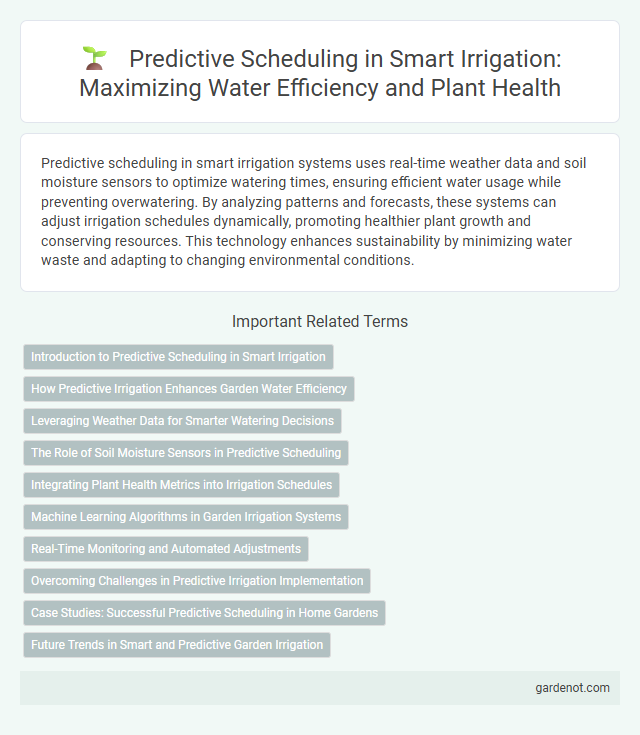Predictive scheduling in smart irrigation systems uses real-time weather data and soil moisture sensors to optimize watering times, ensuring efficient water usage while preventing overwatering. By analyzing patterns and forecasts, these systems can adjust irrigation schedules dynamically, promoting healthier plant growth and conserving resources. This technology enhances sustainability by minimizing water waste and adapting to changing environmental conditions.
Introduction to Predictive Scheduling in Smart Irrigation
Predictive scheduling in smart irrigation leverages real-time weather data, soil moisture levels, and historical climate patterns to optimize watering times and durations, ensuring precise water usage. Advanced algorithms analyze these data inputs to forecast plant water needs, reducing water waste while promoting healthy crop growth. Integration with IoT sensors and automated controllers enhances efficiency by adapting irrigation schedules dynamically based on predicted environmental conditions.
How Predictive Irrigation Enhances Garden Water Efficiency
Predictive irrigation leverages advanced weather data and soil moisture sensors to optimize watering schedules, significantly reducing water waste in garden maintenance. By forecasting precise plant water needs, it ensures irrigation occurs only when necessary, enhancing overall water efficiency. This method also minimizes runoff and evaporation losses, contributing to sustainable garden care.
Leveraging Weather Data for Smarter Watering Decisions
Predictive scheduling in smart irrigation systems leverages real-time and historical weather data such as rainfall, temperature, and humidity to optimize watering times and durations. By analyzing accurate weather forecasts and soil moisture levels, these systems reduce water waste while maintaining optimal plant health. Integrating machine learning algorithms improves the precision of irrigation schedules, ensuring efficient water use in both residential and agricultural settings.
The Role of Soil Moisture Sensors in Predictive Scheduling
Soil moisture sensors play a critical role in predictive scheduling by providing real-time data on soil hydration levels, enabling irrigation systems to anticipate water needs accurately. These sensors help optimize water usage by preventing overwatering and underwatering, improving crop health and conserving resources. Integrating soil moisture data with weather forecasts enhances predictive models, ensuring precise irrigation timing based on actual soil conditions.
Integrating Plant Health Metrics into Irrigation Schedules
Integrating plant health metrics into predictive irrigation scheduling enables precise water delivery based on real-time physiological data such as soil moisture levels, leaf water potential, and chlorophyll fluorescence. Advanced sensors and AI algorithms analyze these metrics to forecast plant water needs, optimizing irrigation efficiency while reducing water waste. This approach enhances crop yield and health by aligning irrigation timing and volume with the specific requirements of each plant growth stage.
Machine Learning Algorithms in Garden Irrigation Systems
Machine learning algorithms enhance predictive scheduling in garden irrigation systems by analyzing historical weather data, soil moisture levels, and plant water needs to optimize watering times and amounts. These algorithms dynamically adjust irrigation schedules, reducing water waste and promoting healthier plant growth. Integration of real-time sensor data with predictive models ensures efficient, sustainable water management tailored to specific garden environments.
Real-Time Monitoring and Automated Adjustments
Predictive scheduling in smart irrigation leverages real-time monitoring of soil moisture, weather data, and plant health to optimize water usage efficiently. Automated adjustments dynamically modify irrigation schedules based on sensor input, reducing water waste and promoting healthier crop growth. Advanced algorithms analyze continuous data streams, ensuring irrigation occurs precisely when and where it is needed.
Overcoming Challenges in Predictive Irrigation Implementation
Predictive scheduling in smart irrigation leverages advanced data analytics and weather forecasting models to optimize water usage, yet challenges such as data accuracy, sensor integration, and algorithm adaptability must be addressed to ensure reliable outcomes. Implementing robust machine learning techniques alongside real-time soil moisture and climatic monitoring can enhance the precision of irrigation predictions. Overcoming these obstacles requires continuous calibration of systems to local environmental conditions and incorporating feedback loops for dynamic adjustment.
Case Studies: Successful Predictive Scheduling in Home Gardens
Predictive scheduling in smart irrigation systems uses weather forecasts and soil moisture data to optimize watering times, significantly improving water efficiency in home gardens. Case studies reveal that integrating AI-driven predictive models reduces water usage by up to 30% while maintaining healthier plant growth. Homeowners report enhanced convenience and sustainability, highlighting the practical benefits of smart irrigation technologies.
Future Trends in Smart and Predictive Garden Irrigation
Predictive scheduling in smart irrigation leverages AI algorithms and weather forecasting data to optimize water usage and enhance plant health by adjusting watering times based on soil moisture levels and climate conditions. Future trends include integrating machine learning models with IoT sensors to create fully autonomous irrigation systems that anticipate plant water needs and reduce water waste. Advances in satellite imaging and real-time data analytics will further refine predictive accuracy, enabling precision agriculture at scale.
Predictive scheduling Infographic

 gardenot.com
gardenot.com